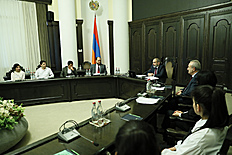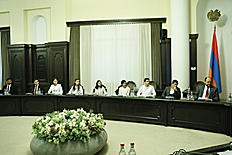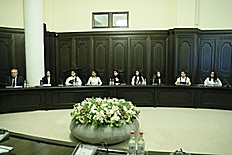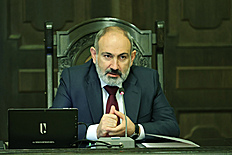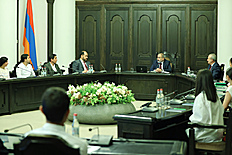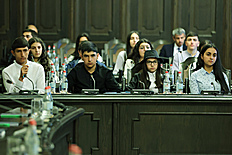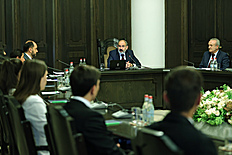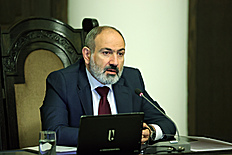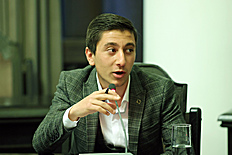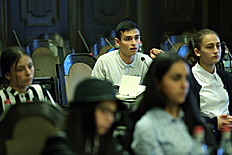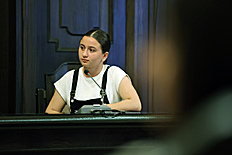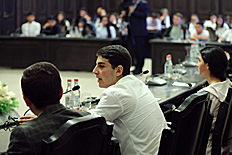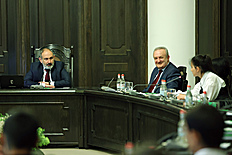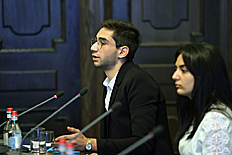Press releases
We celebrate Citizen's Day to record the fact that the source of de jure and de facto power in Armenia is the people - Prime Minister
more 11 photos
Today, on the occasion of Citizen's Day, Prime Minister Nikol Pashinyan met with members of the Student Council under the Minister of Education, Science, Culture and Sports, who represent the 8th-11th grades of different schools in the country.
The meeting was also attended by the Chief of Staff of the Prime Minister Arayik Harutyunyan, Minister of Education, Science, Culture and Sport Vahram Dumanyan, Deputy Minister of Education, Science, Culture and Sport Zhanna Andreasyan.
During the meeting, the Prime Minister talked to the students about the important role of the citizen in the development of a democratic state, the transformation of the citizen into a symbol of power following the Non-violent, velvet, popular revolution in the Republic of Armenia in 2018 and a number of other issues.
Congratulating everyone on the Citizen’s Day, the Prime Minister said, “This is also a good opportunity to think and discuss a number of concepts, in particular, "human being", "citizen", "people", "nation", "homeland", "country", "state", "rights", "responsibilities", "freedoms", "law", "legitimacy”. According to the Prime Minister, it is the attitude towards these concepts, not the right or wrong perceptions that creates reality, because there are different models in the world, different results, every nation, state decides for itself what is the right place for it. Speaking about the concepts of "citizen", "subject", the Prime Minister noted that there is a very important political meaning in the development of those concepts. “What is the political meaning of that? I spoke about the law, the state, the state does not exist without the power, therefore, the fundamental issue here is the following. If we take the words "subject" and "citizen" from the so-called amplitude, then the main question is the following: who is the source of power, that is, where does the source of power come from? In those days, when there was the notion of a subject, it was generally accepted that power stemmed from a monarch or from God and a monarch. Later, the situation changed when the citizens started engaging in politics and revolutions took place.
I'm sure you have read about the Cromwell's revolution in England and subsequent revolutions. In this respect, the French Revolution had the most fundamental significance. The source of power has changed since then. And the citizens became the source of power. But it also happened so that the power stemming from the citizens subjugated the citizens. In other words, it seemed that they transformed from a subject to a citizens, becoming a source of power. During the same French revolution, they brought the people to power through a revolution, after which the government, in fact, subjugated the citizens again, after which, after the revolution, they had an emperor again in the person of Napoleon Bonaparte."
The Prime Minister noted that in the modern world, even in countries where there is a monarchy, in many cases the citizen continues to be a source of power, to the extent that they elect the government. But since not everything is so simple, authoritarian and dictatorial countries are born in that logic. According to the Prime Minister, they are called hybrid regimes by modern human rights organizations, because it is written in the Constitution that the government is formed through free elections, but in reality the elections are not so free, sometimes election frauds, electoral bribes take place or de facto, elections do not take place at all.
In this context, Nikol Pashinyan spoke about why Citizen’s Day was introduced in the Republic of Armenia. “For a simple reason, we celebrate Citizen's Day to record the fact that in the Republic of Armenia the source of de jure and de facto power is the people. In 2018, when the Nonviolent, velvet, popular revolution took place in Armenia, and early parliamentary elections were held in December 2018, all international organizations assessed them as in line with democratic standards. This was the first internationally observed election in Armenia that received such a high assessment. But at that time there was a perception that these were elections held on the wave of post-revolutionary excitement, and in principle, the government did not even need to falsify the elections. Therefore, if there was no need, there was no sense in rigging the elections. So, yes, it is true, the elections were free, fair, transparent, but in principle it is not clear yet if the government is in different situation, whether the same government will show the same will, will hold free elections."
In this context, the Prime Minister noted that the 2021 early parliamentary elections in Armenia proved that they also meet the democratic standards. “We held early parliamentary elections in 2021 and, as I had said immediately after the 2018 revolution, it does not matter how many votes the political forces won and who won the majority as a result of the elections, because the key point of democratic elections is that it is the people who always win, that is, the citizen, as far as he sees, feels, knows that the power and the election results were formed as a result of his vote. Of course, the next question is to what extent that vote was legal, to what extent legal conditions were provided for the elections? Here, again, we usually refer to international observers who said about the 2021 elections that they meet the democratic standards.
The only remark, in fact, was that the hate speech had a large part during the pre-election campaign, which was right, which was not good. But at that time we had what we had. Both the opposition and the government were involved in that process, but the important thing is that the decision in the elections was made by the people. Here, the Citizen's Day comes to record and value that right today. The citizen of the Republic of Armenia knows that he has the opportunity to elect a government at all levels - national and local self-government, which does not mean that our elections are perfect. In the local government elections, we saw a number of issues related to slightly different regulations, but, in general, we must state that yes, Citizen's Day is not only a calendar day, but also has a meaning, has symbolism on this very circumstance."
The Prime Minister also said, “Of course, this is not all, because I think the greatest issue for us, as a state, as a people and as a citizen, is clarifying our relations with the concepts I mentioned at the beginning – “homeland”, “country”, “state”, “human being”, “citizen”, “nation”, here I removed the “people”, because our Constitution defines the collectivity of the citizens as the “people” – “right”, “responsibility”, “legitimacy”. And whenever we are able to position ourselves correctly in these concepts, we will succeed, and whenever we are not able to position ourselves correctly in these concepts, we will not succeed. Politics is largely about this. And how to decide which position is right and which position is wrong? Democracy has been created just for this, so that different political forces can present their interpretations, and the people will decide during the elections which of these positions is correct, and the further actions will follow those decisions”.
Nikol Pashinyan emphasized the importance of freedom of speech. "I also want to emphasize that, of course, elections, of course, democracy, but all this can not exist without freedom of speech, without freedom of assembly, freedom of expression, freedom of movement, and a number of freedoms. And our task is to ensure all those freedoms in a way that they contribute to the rule of law and the protection of rights."
According to the Prime Minister, the disadvantage of democracy is that in countries without rich democratic traditions, also people of the post-Soviet area, the guarantee of freedoms in the perceptions of the people is sometimes perceived as a weakness of power. "But I also want to emphasize that in the context of what I have said, it is very important for democracies to develop institutions. These institutions are the law, the rule of law, the judiciary, the legislature, the executive, the local self-government bodies, and of course, the most important of the institutions is the citizen, the institution of the citizen, which is of great importance for us, because as I already said, we all have both rights and responsibilities as citizens. And rights and responsibilities must be in the right balance.” Nikol Pashinyan noted that the balance of rights and responsibilities means that an institutional problem has really been solved, stressing that Armenia is on that path.
The Prime Minister then answered a number of students' questions on the concept of "patriotism", the development of education, the involvement of women in public and political life, and other topics.
